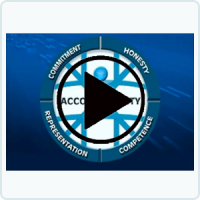Can you trust your team to do what they say they will – and get it done on time?
That is the essence of team trust and accountability. When virtual team members trust each other, they share tasks, ideas, information – and most of all, RESPONSIBILITY. Without trust and accountability, we are less honest, and less willing to collaborate and openly communicate; instead energy is spent on self-protective measures. We may resort to withholding, withdrawal, persuasion, or argumentation.
Clearly, team trust and accountability is one of the most important aspects of working on a team because it leads to team effectiveness. This is true for both on-site and virtual teams. Building trusting workplace relationships is even more applicable in the virtual environment because the true measurement of each team member’s success is the person’s contribution to the group’s efforts.
In fact, it doesn’t matter whether members are all remote or virtual; what matters most is staying on target and being clear on what each team member is truly responsible for achieving.
Why is Team Trust So Important

“Business is conducted through relationships, and trust is about relationships.
Those who are open with information about their thoughts, ideas, and feelings earn high levels of trust in relationships.”
Yael Zofi
A Manager’s Guide to Virtual Teams
p. 7
When team members trust each other, they share tasks, ideas, information – and most of all, responsibility.
Accountability provides the energy for the virtual team’s day-to-day activities, but building trust is the larger concept and at the very core of all human interactions.
A team whose individuals are constantly supporting each other will be more productive, because they want to help each other to achieve the best possible outcomes. So, they share what they know and feel comfortable reaching out to others when they need a hand or hit a snag.
Be sure to read the section on CONTEXT COMMUNICATION HAZARDS first because trust and accountability are based on clear, open communication. There are often missing pieces to make up for, such as context, environment, body language and relationships.
If you want people on virtual teams to develop the kinds of workplace relationships that business is built on, the ones that help get things done and move projects forward, you want to build leadership trust and ensure that team trust and accountability are present.
Trust is an essential structural and cultural component of any high performing virtual team. It affects the team’s ability to communicate, overcome differences, and engage in true collaboration.
The WHEEL OF TRUST™ is AIM Strategies® proprietary model to achieve accountability and trust. In her latest book, A Manager’s Guide to Virtual Teams, Yael refers to the four ‘spokes’ in the Wheel of Trust™ as Honesty, Commitment, Competence and Representation, and discusses numerous behaviors and actions to achieve clarity around trust.
For additional articles, research, and proven methods for strengthening accountability and trust among the individuals on your virtual team, visit Yael’s Blog or Contact pages.




